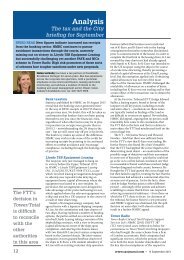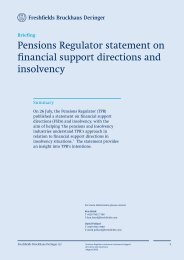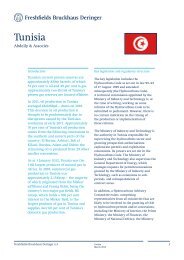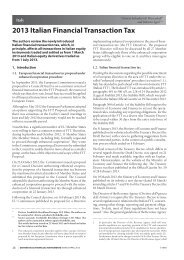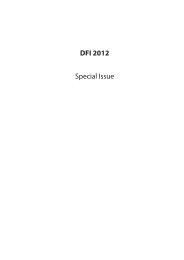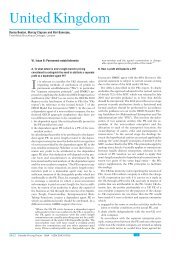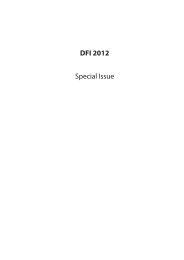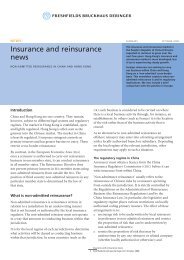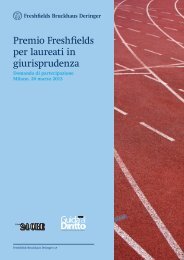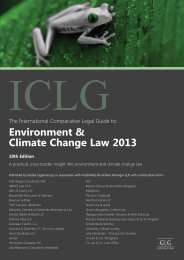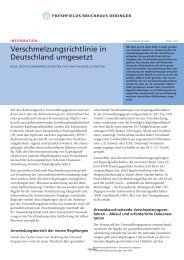Survey tax deductibility of interest payments - Freshfields
Survey tax deductibility of interest payments - Freshfields
Survey tax deductibility of interest payments - Freshfields
You also want an ePaper? Increase the reach of your titles
YUMPU automatically turns print PDFs into web optimized ePapers that Google loves.
<strong>Survey</strong> on the <strong>tax</strong> <strong>deductibility</strong><br />
<strong>of</strong> <strong>interest</strong> <strong>payments</strong><br />
November 2012<br />
<strong>Freshfields</strong> Bruckhaus Deringer llp
<strong>Survey</strong> on the <strong>tax</strong> <strong>deductibility</strong> <strong>of</strong> <strong>interest</strong> <strong>payments</strong><br />
Please note: This survey will only provide for a very basic high-level overview <strong>of</strong> the most relevant rules regarding the <strong>tax</strong> <strong>deductibility</strong><br />
<strong>of</strong> <strong>interest</strong> <strong>payments</strong> in the countries mentioned below. For more detailed information we recommend that you contact one <strong>of</strong> our local <strong>tax</strong> partners<br />
whose contacts are listed below.<br />
Austria Belgium France Germany Italy<br />
Relevant<br />
provisions<br />
General thin cap test:<br />
Based on administrative<br />
practice/court decisions,<br />
3:1 debt-to-equity ratio<br />
as guideline.<br />
Related Party Provisions:<br />
Special provisions re <strong>interest</strong><br />
<strong>payments</strong> to related enterprises/<br />
controlling shareholders<br />
No <strong>interest</strong> deduction in case <strong>of</strong><br />
certain scenarios <strong>of</strong> debt-financed<br />
acquisitions <strong>of</strong> shares.<br />
Thin cap rules:<br />
No deduction <strong>of</strong> <strong>interest</strong> paid to<br />
lenders resident in <strong>tax</strong> havens or<br />
from same group as the borrower<br />
to the extent 5:1 debt-to-equity<br />
ratio is exceeded.<br />
Thin cap rules. Special provisions<br />
re <strong>interest</strong> <strong>payments</strong> to related (or<br />
deemed related) entities (Related<br />
Party Provisions): No <strong>interest</strong><br />
deduction ins<strong>of</strong>ar as yearly <strong>interest</strong><br />
<strong>payments</strong> exceed the higher <strong>of</strong><br />
• related party debt to net equity<br />
ratio <strong>of</strong> 1.5 to 1,<br />
• 25 per cent <strong>of</strong> the <strong>tax</strong> EBITDA,<br />
• <strong>interest</strong> received from<br />
related parties.<br />
Interest non-deductible can be<br />
carried forward to subsequent<br />
years (subject to a 5 per cent<br />
yearly discount).<br />
Loans/advances extended by<br />
non-related party lenders treated<br />
as ‘deemed related party’ loans<br />
where guarantees/securities have<br />
been granted to the lenders by an<br />
entity related to the borrower.<br />
‘Maximum allowed <strong>interest</strong> rates’<br />
for shareholder loans.<br />
Interest barrier rule:<br />
Full deduction up to company’s<br />
<strong>interest</strong> income; exceeding <strong>interest</strong><br />
only deductible up to 30 per cent <strong>of</strong><br />
<strong>tax</strong> EBITDA.<br />
Non-deductible <strong>interest</strong> may be<br />
carried forward indefinitely.<br />
‘Unused’ <strong>tax</strong> EBITDA can be used<br />
in the following 5 years.<br />
Interest barrier rule:<br />
Full deduction up to company’s<br />
<strong>interest</strong> income; exceeding <strong>interest</strong><br />
only deductible up to 30 per cent <strong>of</strong><br />
the <strong>tax</strong> EBITDA.<br />
Non-deductible <strong>interest</strong> and<br />
‘unused’ <strong>tax</strong> EBITDA can be<br />
carried forward indefinitely (can<br />
also be used by other companies<br />
within a <strong>tax</strong> group; possibility <strong>of</strong><br />
a ‘virtual <strong>tax</strong> group’ with foreign<br />
subsidiaries).<br />
Prior: Other rules limiting the<br />
deduction <strong>of</strong> <strong>interest</strong> expenses<br />
(eg transfer pricing, special rules<br />
on bonds).<br />
<strong>Freshfields</strong> Bruckhaus Deringer llp<br />
<strong>Survey</strong> on the <strong>tax</strong> <strong>deductibility</strong> <strong>of</strong> <strong>interest</strong> <strong>payments</strong><br />
November 2012<br />
1
Austria Belgium France Germany Italy<br />
Additional anti debt<br />
pushdown rules:<br />
National <strong>interest</strong> deduction<br />
regime<br />
In <strong>tax</strong> group contexts and outside<br />
<strong>tax</strong> groups basically applicable if<br />
decision taking/control<br />
re-acquired company is exercised<br />
outside France.<br />
National deduction allowed in<br />
respect <strong>of</strong> cash equity injections/<br />
pr<strong>of</strong>it retentions.<br />
Special provisions re <strong>interest</strong><br />
<strong>payments</strong> derived by lenders in<br />
certain non-cooperative States.<br />
Personal<br />
scope <strong>of</strong><br />
application<br />
No personal exceptions.<br />
Exceptions only for certain<br />
leasing/factoring companies/<br />
companies developing PPP projects.<br />
Exceptions only for financial<br />
institutions and groups that<br />
are consolidated for <strong>tax</strong>/<br />
accounting purposes.<br />
No personal exceptions.<br />
Exceptions for banks/insurances/<br />
other finance companies, which<br />
are subject to a different regime for<br />
the deduction <strong>of</strong> <strong>interest</strong> expenses.<br />
Exceptions No specific exceptions. Bonds/similar securities issued via<br />
public emissions and loans granted<br />
by credit institutions, insurance<br />
companies etc are excluded from<br />
thin cap rules.<br />
Certain exceptions re thin<br />
capitalisation rules for certain<br />
‘deemed related party’ loans.<br />
Certain exceptions re anti debt<br />
push down rules for non-<strong>tax</strong><br />
groups if the following conditions<br />
are met:<br />
• Loans do not relate to<br />
acquisition <strong>of</strong> shares, or<br />
• acquiring company has lower<br />
debt-equity ratio than the group<br />
to which it belongs, or<br />
Basically three exceptions:<br />
• Interest expenses do not exceed<br />
EUR3m per year.<br />
• Relevant business is not part <strong>of</strong><br />
a group (Group Exception).<br />
• Taxpayer can prove – if he is<br />
part <strong>of</strong> a group – that equity<br />
ratio is not more than 2 per cent<br />
lower than equity ratio <strong>of</strong> the<br />
group (Escape Clause).<br />
No application <strong>of</strong> <strong>interest</strong> barrier<br />
rule to <strong>interest</strong> capitalised on<br />
the cost <strong>of</strong> assets and to <strong>interest</strong><br />
expenses arising in a zero-balance<br />
cash pooling.<br />
• total value <strong>of</strong> acquired shares is<br />
less than EUR1m.<br />
2 <strong>Freshfields</strong> Bruckhaus Deringer llp<br />
<strong>Survey</strong> on the <strong>tax</strong> <strong>deductibility</strong> <strong>of</strong> <strong>interest</strong> <strong>payments</strong><br />
November 2012
Austria Belgium France Germany Italy<br />
In place since Related Party Provision: Since 2011 No recent changes. Thin cap rules: Since 2007.<br />
New anti debt push down rules<br />
for non-<strong>tax</strong> groups: Introduced in<br />
2012 with retroactive effect back<br />
to 2004.<br />
Since 2008. Interest barrier rule: Since 2008.<br />
National <strong>interest</strong> deduction rules:<br />
Since 2011.<br />
Consequences<br />
/other<br />
relevant<br />
issues<br />
Some established debt-push-down<br />
structures no longer usable, but<br />
structuring alternatives available.<br />
Only limited possibilities for debtpush<br />
down structures.<br />
Not yet enacted: Provisions re<br />
companies subject to CIT, should<br />
cap the deduction <strong>of</strong> net financial<br />
charges paid to both related and<br />
non related companies Rules not<br />
applicable if total amount <strong>of</strong> net<br />
financial charges is less than<br />
EUR3M.<br />
Interest limitation rule especially<br />
relevant for Holding companies<br />
(as they have a low <strong>tax</strong> EBITDA);<br />
Establishment <strong>of</strong> fiscal unity might<br />
enable further <strong>interest</strong> deduction<br />
at holding level (as parent company<br />
and dominated company are<br />
considered as one business).<br />
Debt-push-down structures might<br />
be challenged by fiscal authorities.<br />
Risk: Administrative practice in<br />
recent past to disallow certain<br />
debt-push down structures.<br />
<strong>Freshfields</strong> Bruckhaus Deringer llp<br />
<strong>Survey</strong> on the <strong>tax</strong> <strong>deductibility</strong> <strong>of</strong> <strong>interest</strong> <strong>payments</strong><br />
November 2012<br />
3
Luxembourg The Netherlands Spain UK US<br />
Relevant<br />
provisions<br />
General thin cap test:<br />
85:15 debt-to-equity ratio<br />
in relation to funding <strong>of</strong><br />
participations qualifying for the<br />
participation exemption, no legal<br />
provision, but established by<br />
fiscal authorities.<br />
Thin cap rules:<br />
In principle 3:1 debt-to-equity ratio;<br />
relevant only to the extent the<br />
<strong>interest</strong> amount exceeds<br />
EUR500,000; loans payable and<br />
loans receivable are netted in<br />
calculating the debt-to-equity ratio;<br />
deduction restriction is capped at<br />
the net <strong>interest</strong> payable to related<br />
parties). Expected to be abolished<br />
per 1 January 2013.<br />
Anti Base Erosion Rule:<br />
Disallows deductions for<br />
<strong>interest</strong> paid to a related person<br />
in connection with a pr<strong>of</strong>it<br />
distribution, a capital contribution<br />
or the acquisition <strong>of</strong> shares<br />
resulting in the target becoming a<br />
related party.<br />
Low Interest Bearing Loan Rule:<br />
No <strong>interest</strong> deduction for<br />
<strong>interest</strong> paid to a related entity<br />
if underlying loan has no fixed<br />
term/a term <strong>of</strong> more than 10 years<br />
and the <strong>interest</strong> is lower than at<br />
arm’s length terms.<br />
Interest barrier rule:<br />
Full deduction <strong>of</strong> net financial<br />
expenses (<strong>interest</strong> expenses<br />
exceeding <strong>interest</strong> income <strong>of</strong> the<br />
year) only up to 30 per cent <strong>of</strong> the<br />
year’s operating pr<strong>of</strong>it (calculated<br />
by reference to Spanish GAAP but<br />
with certain <strong>tax</strong> adjustments).<br />
Non-deductible net financial<br />
expenses may be used in the<br />
following 18 years. ‘Unused’<br />
operating pr<strong>of</strong>it can be used in<br />
the following 5 years.<br />
This rule captures both external<br />
debt and intra-group debt which<br />
is not previously captured (and<br />
treated as non-deductible) by the<br />
special rules featured below.<br />
Intra-Group Debt Limitation:<br />
Non-<strong>deductibility</strong> <strong>of</strong> any <strong>interest</strong><br />
due on any type <strong>of</strong> debt incurred<br />
with group companies resulting<br />
(i) from intra-group sales <strong>of</strong> equity<br />
<strong>interest</strong> in other group companies,<br />
or (ii) in equity investments in<br />
group companies.<br />
Intra-group debt is also subject<br />
to Spanish transfer pricing<br />
limitations (ie <strong>interest</strong> due to be<br />
at arm’s length).<br />
Thin cap rules:<br />
No fixed debt-to-equity ratio;<br />
instead analysis if third party<br />
would also have granted<br />
comparable amount <strong>of</strong> debt.<br />
Worldwide debt cap (WWDC):<br />
In a worldwide group <strong>of</strong><br />
companies with one or more<br />
75 per cent+ owned UK<br />
subsidiaries, the aggregate <strong>of</strong> net<br />
financing expenses <strong>of</strong> UK members<br />
must not exceed the total gross<br />
external financing expense <strong>of</strong><br />
the worldwide group.<br />
Equity features:<br />
Restrictions for debt with certain<br />
equity-like features, such as results<br />
dependent <strong>interest</strong>, or debt stapled<br />
to equity instruments.<br />
Interest on debt funding foreign<br />
investment fully deductible, but<br />
is (at least partly) allocated against<br />
foreign source income for purposes<br />
<strong>of</strong> determining how much foreign<br />
<strong>tax</strong> the borrower can credit against<br />
its US <strong>tax</strong> liability.<br />
Earnings stripping rule: Interest<br />
owed to or guaranteed by related<br />
foreign persons not deductible<br />
to the extent debtor’s annual net<br />
<strong>interest</strong> expense exceeds half <strong>of</strong><br />
its EBITDA.<br />
Cash payment requirement:<br />
No deduction for <strong>interest</strong> to related<br />
foreign persons until <strong>interest</strong> is<br />
paid in cash.<br />
4 <strong>Freshfields</strong> Bruckhaus Deringer llp<br />
<strong>Survey</strong> on the <strong>tax</strong> <strong>deductibility</strong> <strong>of</strong> <strong>interest</strong> <strong>payments</strong><br />
November 2012
Luxembourg The Netherlands Spain UK US<br />
Overleveraged Acquisition<br />
Holdings Rule:<br />
Effectively limits set-<strong>of</strong>f <strong>of</strong><br />
<strong>interest</strong> costs on funding for the<br />
acquisition <strong>of</strong> Netherlands target<br />
companies against the pr<strong>of</strong>its <strong>of</strong><br />
such targets if amount <strong>of</strong> debt is<br />
considered excessive.<br />
Targeted anti-avoidance rule:<br />
Non-<strong>deductibility</strong> <strong>of</strong> <strong>interest</strong> where<br />
a company is party to a loan with<br />
a main purpose <strong>of</strong> securing a UK<br />
<strong>tax</strong> advantage.<br />
Participation Debt Interest<br />
Restriction:<br />
Restricted <strong>interest</strong> deduction <strong>of</strong><br />
<strong>interest</strong> on debt used to finance<br />
shareholdings qualifying for the<br />
participation exemption.<br />
Relevant only to the extent<br />
qualifying participations do not<br />
exceed <strong>tax</strong> equity. Relevant only<br />
to the extent the ‘tainted’ <strong>interest</strong><br />
amount exceeds EUR750,000.<br />
Personal<br />
scope <strong>of</strong><br />
application<br />
All companies resident in<br />
Luxembourg for Luxembourg<br />
corporate income <strong>tax</strong> purposes.<br />
No personal exceptions.<br />
Interest barrier rule:<br />
No application to<br />
• credit entities and insurance<br />
companies<br />
• all entities in respect to the <strong>tax</strong><br />
period <strong>of</strong> their extinction (but<br />
certain exceptions)<br />
WWDC:<br />
Exceptions for Financial services<br />
groups. Optional disregard <strong>of</strong><br />
treasury companies. Relaxations<br />
for securitisation companies,<br />
llp’s & CIS’s.<br />
Earnings stripping rule only<br />
affects corporations.<br />
<strong>Freshfields</strong> Bruckhaus Deringer llp<br />
<strong>Survey</strong> on the <strong>tax</strong> <strong>deductibility</strong> <strong>of</strong> <strong>interest</strong> <strong>payments</strong><br />
November 2012<br />
5
Luxembourg The Netherlands Spain UK US<br />
Exceptions No exceptions. Overleveraged Acquisition<br />
Holdings Rule:<br />
No excessive debt financing if debt<br />
does not exceed 60 per cent <strong>of</strong> the<br />
acquisition price.<br />
Participation Debt Interest<br />
Restriction:<br />
Participations are not taken<br />
into account if they were<br />
acquired as expansion <strong>of</strong> the<br />
operational activities <strong>of</strong> the group<br />
and are not funded with any form<br />
<strong>of</strong> ‘double-dip’ debt.<br />
Interest barrier rule:<br />
No application if net<br />
financial expenses do not<br />
exceed EUR1m per year.<br />
No exceptions.<br />
Earnings stripping rule not<br />
applicable unless debt/equity<br />
ratio <strong>of</strong> debtor’s affiliated group<br />
exceeds 1.5/1.0.<br />
In place since No recent changes. Thin cap rules: May be abolished as<br />
<strong>of</strong> 1 January 2013.<br />
Overleveraged Acquisition Holdings<br />
Rule: Since 2012.<br />
Participation Debt Interest<br />
Restriction: As <strong>of</strong> 1 January 2013.<br />
Interest barrier rules and special<br />
intra-group debt rules (not transfer<br />
pricing): Since 2012.<br />
WWDC: Since 2010.<br />
No recent changes in relation to<br />
the other rules.<br />
No recent changes. Discussion<br />
about adopting a territorial system<br />
(which would deny deductions for<br />
<strong>interest</strong> related to un<strong>tax</strong>ed foreign<br />
income) or deferral <strong>of</strong> deductions<br />
for <strong>interest</strong> until related foreign<br />
income is repatriated.<br />
Consequences<br />
/other<br />
relevant<br />
issues<br />
New possibilities to fund<br />
Netherlands companies with<br />
group debt as <strong>of</strong> 1 January 2013<br />
due to intended abolishment <strong>of</strong><br />
thin cap rules.<br />
Use <strong>of</strong> non-resident entities and<br />
alternative financing structures<br />
might attenuate the effects <strong>of</strong> the<br />
new <strong>interest</strong> barrier rule.<br />
Careful structuring <strong>of</strong> shareholder<br />
loans can mitigate disallowances<br />
under the WWDC rules.<br />
Allocating <strong>interest</strong> to determine<br />
the foreign <strong>tax</strong> credit limitation<br />
can have the same economic effect<br />
as denial <strong>of</strong> the deduction.<br />
6 <strong>Freshfields</strong> Bruckhaus Deringer llp<br />
<strong>Survey</strong> on the <strong>tax</strong> <strong>deductibility</strong> <strong>of</strong> <strong>interest</strong> <strong>payments</strong><br />
November 2012
Our contacts<br />
UK<br />
Peter Clements<br />
London<br />
T +44 20 7785 5750<br />
E peter.clements@<br />
freshfields.com<br />
Netherlands<br />
Machiel Lambooji<br />
Amsterdam<br />
T +31 20 485 7608<br />
E machiel.lambooij@<br />
freshfields.com<br />
Italy<br />
Vittorio Salvadori<br />
Milan<br />
T +39 02 625 30454<br />
E vittorio.salvadori@<br />
freshfields.com<br />
France<br />
Vincent Daniel-Mayeur<br />
Paris<br />
T +33 1 44 56 33 80<br />
E vincent.daniel-mayeur@<br />
freshfields.com<br />
Austria<br />
Claus Staringer<br />
Vienna<br />
T +43 1 515 15 117<br />
E claus.staringer@<br />
freshfields.com<br />
Germany<br />
Georg Roderburg<br />
Düsseldorf<br />
T +49 211 49 79 346<br />
E georg.roderburg@<br />
freshfields.com<br />
Spain<br />
Miguel Lorán<br />
Madrid and Barcelona<br />
T +34 91 700 3770<br />
E miguel.loran@<br />
freshfields.com<br />
Belgium<br />
Axel Haelterman<br />
Brussels<br />
T +32 2 504 7260<br />
E axel.haelterman@<br />
freshfields.com<br />
US<br />
Claude Stansbury<br />
Washington<br />
T +1 202 777 4507<br />
E claude.stansbury@<br />
freshfields.com<br />
<strong>Freshfields</strong> Bruckhaus Deringer llp<br />
<strong>Survey</strong> on the <strong>tax</strong> <strong>deductibility</strong> <strong>of</strong> <strong>interest</strong> <strong>payments</strong><br />
November 2012<br />
7



